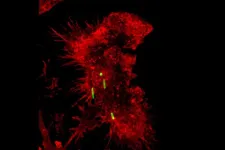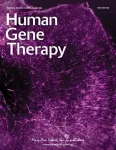MSK Research Highlights, August 24, 2023
2023-08-24
(Press-News.org)
New research from Memorial Sloan Kettering Cancer Center (MSK) and the Sloan Kettering Institute — a hub for basic science and translational research within MSK — suggests a method for revealing DNA repair “scars” could help make treatment decisions in BRCA1- and BRCA2-deficient cancers; modified a bacteria-made compound to target mutant KRAS-driven cancers; and shed new light on brain metastasis in non-small cell lung cancer.
New method for revealing DNA repair “scars” could expand use of targeted therapies
Faulty DNA repair mechanisms can lead to an accumulation of mutations and rearrangements in critical genes that then give rise to cancer. Now, MSK and the New York Genome Center (NYGC) have employed a new method of analyzing DNA sequences from tumors that can reveal the genetic “scars” left by backup DNA repair mechanisms that are specific to BRCA1- and BRCA2-deficient cancers. Mutations in BRCA1 and BRCA2 affect DNA repair mechanisms and are responsible for a significant portion of breast, ovarian, prostate, and pancreatic cancers. A new study — led by Jeremy Setton, MD, and Simon Powell, MD, PhD, of MSK’s Sloan Kettering Institute, and by Marcin Imieliński, MD, PhD, of the NYGC — reveals genetic signatures that hold promise for identifying DNA repair-defective cancers.
The research combined an analysis of short-read whole-genome-sequencing profiles across thousands of tumors with deep linked-read sequencing of BRCA1- or BRCA2-deficient breast cancers, discovering a distinct class of homologous recombination deficiency-enriched rearrangements. “With further validation, this new approach could vastly expand the number of patients who could receive therapies that target the faulty DNA repair mechanisms in their cancer,” Dr. Powell says. “As whole genome sequencing becomes cheaper and more practical, these patterns could become an essential part of therapeutic decision-making.” in Nature.
Targeting KRAS with natural product-based compounds
In recent years, drugs have been approved for treating cancers caused by KRAS-G12C, a common form of the KRAS mutation. But the effectiveness of these drugs, which target only the inactive state of mutant KRAS, is often short-lived. Now a team led by researchers from MSK has taken a cue from nature: Inspired by drugs based on molecules found in plants, fungi, and other living organisms, they identified a compound from Streptomyces bacteria and modified it to target the active state of mutant KRAS, a state that historically has proved very difficult to target by conventional methods.
MSK physician-scientist Piro Lito, MD, PhD, and his laboratory collaborated on the research with the company Revolution Medicines. The drug is derived from a natural product called Sanglifehrin A, which interacts with a multipurpose protein called cyclophilin A. By modifying the shape of the natural product, the team was able to sculpt the surface in a way that it could recognize the active version of mutant KRAS, thus preventing its cancer-causing activity. The drug shrank tumors in lab models of non-small cell lung cancer and colorectal cancer, two cancer types with frequent KRAS mutations. Drugs based on this work are already in two clinical trials at MSK (A Phase 1 Study of RMC-6291 in People with KRAS-Mutated Solid Tumors and A Phase I Study of RMC-6236 in People with Advanced Solid Tumors Containing Specific KRAS Mutations). in Science.
MSK research sheds new light on brain metastasis in non-small cell lung cancer
About half of patients diagnosed with non-small cell lung cancer (NSCLC) will have their cancer spread to their brain. Those who develop brain metastasis face a poor outlook with limited treatment options. To date, a lack of data about NSCLC brain metastasis has hampered efforts to understand its fundamental biology and biomarkers of progression in the central nervous system.
Now, a new study from the labs of MSK’s Luke Pike, MD, DPhil, and Nikolaus Schultz, PhD, and aims to advance knowledge by analyzing similarities and differences in the brain metastases, other metastases and primary tumors of individual patients. The research team found important genetic differences between brain metastases and tumors in other parts of the body, such as higher tumor mutation burden. They also found cell cycle pathway alterations, particularly CDKN2A/B deletions, were more common in brain metastases, and patients who had less common EGFR mutations were more likely to have cancer spread to the fluid spaces of the brain (leptomeningeal disease). Overall, the study’s findings offer a foundation for further investigations into the biology of brain metastasis and potential treatments. in Nature Communications.
END
ELSE PRESS RELEASES FROM THIS DATE:
2023-08-24
In a new study co-led by investigators at the United States Department of Veterans Affairs and Brigham and Women’s Hospital, a founding member of the Mass General Brigham healthcare system, a global team of scientists conducted one of the largest genetic association studies on heart failure to date. Using genomic data from over 90,000 heart failure patients and more than a million controls, the team identified 39 genetic mutations associated with heart failure, 18 of which had not been reported previously.
The researchers also pinpointed seven druggable proteins that, when targeted with specially ...
2023-08-24
Inflammation is a standard part of our bodies’ immune system response. But sometimes this response becomes hyperactivated in our lungs, causing inflammation to continue unchecked, which can be fatal. Many deaths from COVID-19 have been due to excessive inflammation, which results in acute lung injury.
A group of researchers at the University of Illinois Chicago have investigated how lungs counterbalance inflammation. Their work points to cells in the lung that reduce inflammation by removing ...
2023-08-24
A study led by Dr. Hyun Kyoung Lee, associate professor at Baylor College of Medicine and investigator at the Jan and Dan Duncan Neurological Research Institute at Texas Children’s Hospital, has discovered a new biological mechanism to regenerate and repair myelin, a protective sheath that insulates neuronal fibers and plays a vital role in ensuring rapid and accurate neurotransmission. The Duncan NRI team found novel roles for the Dishevelled associated activator of morphogenesis 2 (Daam2) protein and CK2α kinase in regulating myelin repair and regeneration. The study was published in the Proceedings of the National ...
2023-08-24
PHILADELPHIA (August 24, 2023) – A bitter taste in the mouth is often a symptom or side effect of illness, which may be the result of how the body reacts to pathogens. A new study published in iScience, by Hong Wang, PhD, an Associate Member at the Monell Chemical Sense Center, and colleagues sheds light on the mechanisms involved in the complex interplay between taste perception and immune function. Their work also highlights the potential of a sequencing tool for investigating epigenetic mechanisms that affect taste-cell gene expression. Epigenetics is the study of how and when genes are expressed rather than alteration of the genetic ...
2023-08-24
Researchers have developed an engineered adeno-associated virus (AAV) vector that yields high transduction of brain vascular pericytes and smooth muscle cells. The study describing the characterization of this novel AAV capsid is published in the peer-reviewed journal Human Gene Therapy. Click here to read the article now.
In the current study, Servio Ramirez, from Temple University School of Medicine, Patricia Musolino, from Massachusetts General Hospital, and Casey Maguire, from Harvard Medical School, and coauthors, characterize AAV-PR, the capsid that demonstrated high transduction of the brain vasculature. AAV-PR offers the ...
2023-08-24
INDIANAPOLIS—Researchers from Indiana University School of Medicine have discovered a neglected brain region that could play a critical role in how likely a person with drug use disorders is to relapse, even after a long withdrawal period. Their findings were published recently in Biological Psychiatry.
“Past studies in the field of addiction research have focused on the medial prefrontal cortex, which is the part of the brain that controls decision making, but no effective prevention or treatment for drug relapse is available,” said Yao-Ying Ma, MD, PhD, associate professor of pharmacology ...
2023-08-24
SAN ANTONIO (Aug. 24, 2023) — Urine levels of adenine, a metabolite produced in the kidney, are predictive and a causative biomarker of looming progressive kidney failure in patients with diabetes, a finding that could lead to earlier diagnosis and intervention, researchers from The University of Texas Health Science Center at San Antonio (also called UT Health San Antonio) reported Aug. 24 in the Journal of Clinical Investigation.
Elevated adenine was also associated with all-cause mortality.
The study results are significant because until now, the most important ...
2023-08-24
LOS ALAMOS, N.M., Aug. 23, 2023 — Mathematical modeling can show how to safely blend hydrogen with natural gas for transport in existing pipeline systems. A secure and reliable transition to hydrogen is one of the proposed solutions for the shift to a net-zero-carbon economy.
“Mixing hydrogen into a natural gas pipeline changes how the gases flow, which will create new conditions for operators,” said Anatoly Zlotnik, a co-author of a new paper on the modeling in the journal PRX Energy. ...
2023-08-24
ChatGPT may match or even exceed the average grade of university students when answering assessment questions across a range of subjects including computer science, political studies, engineering, and psychology, reports a paper published in Scientific Reports. The research also found that almost three-quarters of students surveyed would use ChatGPT to help with their assignments, despite many educators considering its use to be plagiarism.
To investigate how ChatGPT performed when writing university assessments compared to students, Talal Rahwan and Yasir Zaki invited faculty members who taught32 different courses at ...
2023-08-24
Four out of five emperor penguin colonies in the Bellingshausen Sea, Antarctica, saw no chicks survive to fledge successfully in the spring of 2022, reports a study published in Communications Earth & Environment. The study suggests that this complete breeding failure is a direct consequence of the unprecedented loss of sea ice recorded in the region in recent years due to climate change.
Emperor penguin (Aptenodytes forsteri) colonies generally need stable ice attached to the land between April and January to ensure successful breeding and moulting. Any change in the extent of the Antarctic sea ice can affect their ...
LAST 30 PRESS RELEASES:
[Press-News.org] MSK Research Highlights, August 24, 2023

